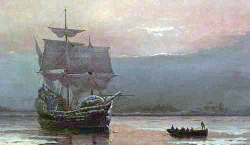Christmas in the Colonies

We're on the countdown to Christmas now, and listening to a new series I have added to RUSC this week, called The World Is Yours, I came across a show, called Christmas in the Colonies.
Produced by the Smithsonian Institution, The World Is Yours series tells of historical events, scientific achievements and technical advances, from the development of aluminium, to the movement of fighting aircraft in World War II.
This particular tale, Christmas in the Colonies, begins in the colonial room of the Smithsonian Institute, where a young couple find themselves under the gentle spell of the past. They are trying to imagine what sort of people lived in a room like the one they're in, and what gifts they might have exchanged on Christmas Day in the colonial days of old Plymouth.
So how did the first settlers celebrate Christmas?
Well as it turns out - they didn't!
In early 17th century England, the Christmas season was not so different from what it is today, with churches and other buildings decorated with holly and ivy, family and friends exchanging gifts, and warm charity for the poor.
It was a period of goodwill and merriment, with the weeks before and after Christmas celebrated with feasting, drinking, singing carols and playing games.
Wealthy lords would throw open the doors to their manors, inviting local peasants and villagers inside to gorge on food and drink, carolers would sing door to door, and groups of young men called wassailers would march in and demand a drink or gifts of money in exchange for their good wishes and songs.
The first Pilgrims to arrive in America aboard the Mayflower in 1620 however, were strict Puritans, who held very firm views on religious holidays such as Christmas and Easter. Nowhere in the Bible was such a celebration mentioned, and so it was banned throughout the 17th and 18th centuries - even classed as a criminal offence between 1659 and 1681.
In fact, on that first rainy Christmas day in 1920, the settlers of the Plymouth colony spent their time working in the fields and building houses, as they would on any other day, and in the years following, anyone caught shirking their work duties, feasting or showcasing their holiday spirit was forced to pay a significant fine of as much as five shillings.
The Puritans were relentless in their boycott, and even with the introduction of other European settlers in the new colonies who continued to celebrate Christmas, the Plymouth colony remained Christmas-less until well into the nineteenth century, when Christmas Day was formally declared a public holiday in 1870 by Ulysses Grant.
These days, many Americans bemoan the indulgent tradition of Christmas in our country. I wonder if they're aware that our actual oldest Christmas tradition is to have no festivities at all? What do you think?
Happy listening my friends,
